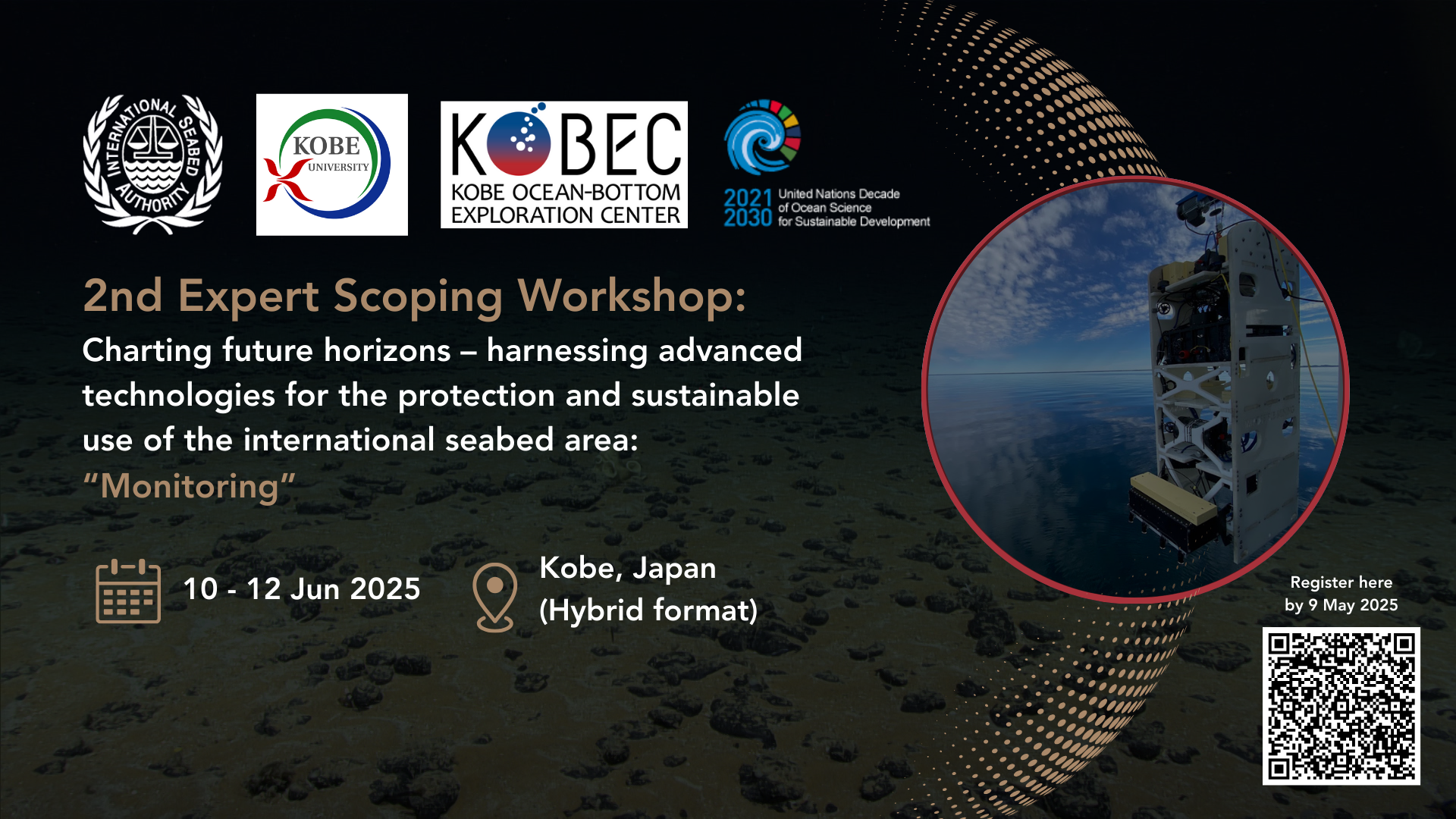2nd Expert Scoping Workshop: Charting future horizons – Harnessing advanced technologies for the protection and sustainable use of the international seabed area: “Monitoring”
10 Jun 2025 - 12 Jun 2025
Kobe, Japan (Hybrid format)
Hybrid format | Background document | Information note | Draft agenda
The International Seabed Authority (ISA) is conducting Expert Scoping Workshops on innovation and advanced technologies to support the protection and responsible use of the Area[1]. These activities build on the Action Plan for Marine Scientific Research approved by the ISA Assembly in 2020, and on the recognised need for ‘facilitating technology development for activities in the Area, including ocean observation and monitoring’[2] while also drawing upon over 40 years of marine exploration, environmental baseline studies, and the development of dedicated marine technologies. The first expert scoping meeting was held in April 2024, in collaboration with the Institute for Systems and Computer Engineering, Technology and Science (INESC TEC), Portugal. The meeting focussed on technologies across five priority areas, including: (i) ocean observation and communication; (ii) monitoring, (iii) autonomy, automation and robotics; (iv) machine learning and artificial intelligence; and (v) mining, energy and processing.
In collaboration with the Kobe Ocean-Bottom Exploration Center (KOBEC) at Kobe University in Japan, the ISA is convening its second Expert Scoping Workshop aimed to assess the key findings of marine technology innovation, with a focus on technical and environmental monitoring- its current design, challenges and future requirements. The discussions will cover a range of topics, including existing and emerging technologies, best industry practices from industry and opportunities to enhance the capacity of developing countries in this field. A central objective of the workshop is to support the formation support strategic partnerships that help identify needs and priorities of ISA member states, particularly developing states. The workshop will also explore avenues for research and development, with the goal of advancing effective, inclusive, and transparent monitoring systems for all seabed activities.
Monitoring constitutes a localised component of ocean observation and communication, encompassing the online/real-time, transparent and reliable observation of all human activities in the marine environment from shipping and fisheries to aquaculture, seabed mineral exploration and potential exploitation. Technological solutions supporting monitoring efforts include satellite imagery, ship-borne measurements, autonomous and robotic systems, automated moorings and lander systems, submarine cable networks and remote communication systems, data dashboards and machine learning applications.
Consistent and reliable measurement of environmental parameters, conducted against defined standards and reported in a timely manner to the Authority, constitutes a regulatory requirement under the Authority’s legal framework.
The workshop outcomes should include proposals for the regional monitoring of areas beyond ISA contracts, to further inform ISA’s Regional Environmental Management Plans (REMPs) and Areas of Particular Environmental Interest (e.g., APEIs in the CCZ), as well as internationally recognised transitional zones of environmental significance crucial for the protection of global biodiversity in the Area. The resulting monitoring frameworks will be presented to inform discussions on ISA standards and guidelines, national expert and contractor training programmes, capacity development initiatives, mining equipment testing and future test mining activities.
The meeting will outline the background, scope and expected outputs, addressing key technologies, technological needs, research and development activities. Each day of the workshop will be summarised through thematic discussions that contribute to advancing effective monitoring. The final day of the workshop will feature a plenary session, including an open discussion and consolidation of future steps, as well as addressing guiding questions for current and emerging technologies for technical and environmental monitoring, best industry practices, and strategic partnerships aimed at building the capacities of developing States, and addressing the current needs and priorities of member states. Additionally, the session will cover emerging technologies and strategies for targeted research and development efforts, particularly with respect to sensor-based environmental monitoring, data acquisition and transfer, and developments toward achieving net zero emissions. This discussion will also focus on the impacted ocean surface, water column and seabed, with the goal of establishing technological approaches for monitoring the entire ocean ecosystem.
As a follow up to the workshop, a final report will be published as an ISA Technical Study on Monitoring in the second half of 2025, summarising the current landscape, outlining the potential pathways forward and identifying activities that the ISA could support to establish robust frameworks and designs for integrated, efficient, reliable and transparent environmental and technical monitoring of all seabed activities in the Area.
The expert workshop will be held from 10-12 June 2025, at the Kobe University, Kobe, Japan. The hybrid meeting will be held in-person and delivered via the Microsoft Teams platform, offering opportunities for both on-site and virtual presentations/discussions. The workshop will be conducted in English. Interested participants must submit their interest through the following registration form, open until 9 May 2025 at midnight (EST).
Expert Scoping Workshop – Registration Form
Selected participants will be informed shortly thereafter in accordance with the established selection criteria, which include professional technological background in areas such as deep-sea monitoring, ocean engineering or marine technical innovation. A pre-workshop report will be distributed to the selected participants following the completion of the selection process.
[1] United Nations Convention on the Law of the Sea, art.145

